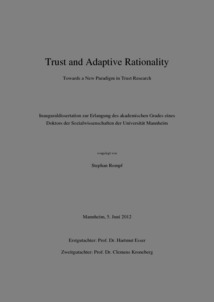|
Trust and adaptive rationality : towards a new paradigm in trust research
Rompf, Stephan
![[img]](https://madoc.bib.uni-mannheim.de/style/images/fileicons/application_pdf.png)  Vorschau |
|
PDF
Thesis_FinalDraft.pdf
- Veröffentlichte Version
Download (4MB)
|
|
URL:
|
https://madoc.bib.uni-mannheim.de/35963
|
|
URN:
|
urn:nbn:de:bsz:180-madoc-359637
|
|
Dokumenttyp:
|
Dissertation
|
|
Erscheinungsjahr:
|
2012
|
|
Ort der Veröffentlichung:
|
Mannheim
|
|
Hochschule:
|
Universität Mannheim
|
|
Gutachter:
|
Esser, Hartmut
|
|
Datum der mündl. Prüfung:
|
6 November 2012
|
|
Sprache der Veröffentlichung:
|
Englisch
|
|
Einrichtung:
|
Fakultät für Sozialwissenschaften > Soziologie II (Esser 1991-2009, Em)
Außerfakultäre Einrichtungen > GESS - CDSS (SOWI)
|
|
Fachgebiet:
|
300 Sozialwissenschaften, Soziologie, Anthropologie
|
|
Normierte Schlagwörter (SWD):
|
Soziologie , Analytische Soziologie , Vertrauen , Urvertrauen , Misstrauen , Zuversicht , Rational Choice , Handlungstheorie , Zwei-Prozess-Modell , Informationsverarbeitung , Experiment , Sozialpsychologie , Experimentelle Wirtschaftsforschung
|
|
Freie Schlagwörter (Deutsch):
|
Modell der Frame-Selektion , Variable Rationalität , Situationslogik , Normalität , Modell der soziologischen Erklärung , Coleman Modell , Theorie mittlerer Reichweite , Vertrauensspiel , Interaktion , soziale Konstruktion des Vertrauens , Identität
|
|
Freie Schlagwörter (Englisch):
|
Trust , Distrust , Confidence , Suspension , Rational Choice , Adaptive Rationality , Information Processing , Dual-Process-Model , Experimental Economics , Analytical Sociology , Social Psychology , Cognition , Norms , Situational Normality
|
|
Abstract:
|
Combining economic, social-psychological and sociological approaches trust, this book provides a general theoretical framework to explain conditional and unconditional trust; it also presents an experimental test of the corresponding integrative model and its predictions. Broadly, it aims at advancing a ‘cognitive turn’ in trust research by highlighting the importance of (1) an actor´s context-dependent definition of the situation and (2) the flexible and dynamic degree of rationality involved in the phenomenon. In essence, trust is as “multi-faceted” as there are cognitive routes that take us to the choice of a trusting act. Therefore, adaptive rationality has to be incorporated as an independent and orthogonal dimension to the typological space of trust. Going from description to prediction, the work develops an analytically precise and tractable model of trust and adaptive rationality. The empirical test presented combines trust games, high- and low-incentive conditions, framing manipulations, and psychometric measurements; it is complemented by decision-time analyses.
|
 | Dieser Eintrag ist Teil der Universitätsbibliographie. |
 | Das Dokument wird vom Publikationsserver der Universitätsbibliothek Mannheim bereitgestellt. |
 Suche Autoren in Suche Autoren in
Sie haben einen Fehler gefunden? Teilen Sie uns Ihren Korrekturwunsch bitte hier mit: E-Mail
Actions (login required)
 |
Eintrag anzeigen |
|
